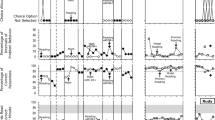Abstract
The purpose of this paper is to present the results of a natural experiment involving academic cheating by university students. We explore the relationship of moral judgment (as measured using the defining issues test) to actual behavior, as well as the relationship between the honesty of students self-reports and the extent of cheating. We were able to determine the extent to which students actually cheated on the take-home portion of an accounting exam. The take-home problem was not assigned with the intent of inducing cheating among students. However, the high rate of observed cheating prompted the instructor to return to class and ask the students to provide information on their motivation. The students' responses are the data analyzed in this natural experiment. We found that in a simple regression the relationship between moral judgment scores and cheating behavior was insignificant. However, when we tested whether including Utilizer scores (i.e. the extent to which people select actions based on notions of justice) affected the relationship of cheating and moral judgment we found that Utilizer affected the relationship significantly. Finally, we found that moral judgment and honesty were not related, but higher levels of cheating behavior related to less honesty.
Similar content being viewed by others
References
Bay, D. D. and R. R. Greenberg: 2001, 'The Relationship of the DIT and Behavior: A Replication', Issues in Accounting Education 16(3), 367–380.
Bebeau, M. J.: 2002, 'The Defining Issues Test and the Four Component Model: Contributions to Profes-sional Education', Journal of Moral Education 31(3), 271–295.
Center for the Study of Ethical Development: 1993, GUIDE for DIT-1 (University of Minnesota, Minneapolis, MN).
Center for the Study of Ethical Development: 1998, Supplement to the GUIDE for DIT-1 (University of Minnesota, Minneapolis, MN).
Cizek, G. J.: 1999, Cheating on Tests: How to Do It, Detect It and Prevent It (Lawrence Erlbaum Associates, Mahwah, NJ).
Crown, D. F. and M. S. Spiller: 1998, 'Learning from the Literature on Collegiate Cheating: A Review of Empirical Research', Journal of Business Ethics 17, 683–700.
Gardner, W. M., J. T. Roper, C. G. Gonzalez and R. G. Simpson: 1988,' Analysis of Cheating on Academic Assignments', The Psychological Record 38, 543–555.
Johns, S. K. and C. A. Strand: 2000, 'Survey Results of the Ethical Beliefs of Business Students', Journal of Education for Business 76, 315–320.
Karlins, M., C. Michaels and S. Podlogar: 1988, 'An Empirical Investigation of Actual Cheating in a Large Sample of Undergraduates', Research in Higher Education 29(4), 359–364.
Mai-Dalton, R.: 1987, 'The Experience of One Faculty Member in a Business Ethics Seminar: What Can We Take Back to the Classroom?', Journal of Business Ethics 6, 509–511.
Malinowski, C. I. and C. P. Smith: 1985, 'Moral Reasoning and Moral Conduct: An Investigation Promp-ted by Kohlberg's Theory', Journal of Personality and Social Psychology 49(4), 1016–1027.
Marnburg, E.: 2001, 'The Questionable Use of Moral Development Theory in Studies of Business Ethics: Discussion and Empirical Findings', Journal of Business Ethics 32, 275–283.
McCabe, D. L. and W. J. Bowers: 1994, 'Academic Dishonesty among Males in college: A Thirty Year Perspective', Journal of College Student Development 35 (January), 5–10.
McCabe, D., L. Trevino and K. Butterfield: 1996, 'The Influence of Collegiate and Corporate Codes of Conduct on Ethics-Related Behavior in the Work-place', Business Ethics Quarterly 6, 461–476.
Miceli, M. P., J. B. Dozier and J. P. Near: 1991, 'Blowing the Whistle on Data Fudging: A Controlled Field Experiment', Journal of Applied Social Psychology 21(4), 271–295.
Moore, M.: 1991, Cheating 101: The Benefits and Fundamentals of Earning the Easy “A.” (Moore Publishing, Hopewell, NJ).
Newstead, S. E., A. Franklyn-Stokes and P. Armstead: 1996, 'Individual Differences in Student Cheating', Journal of Educational Psychology 88(2), 229–241.
Nonis, S. A. and C. O. Swift: 1998, 'Deterring Cheating Behavior in the Marketing Classroom: An Analysis of the Effects of Demographics, Attitudes, and In-class Deterrent Strategies', Journal of Marketing Education 20(3), 188–199.
Nowell, C. and D. Laufer: 1997, 'Undergraduate Student Cheating in the Fields of Business and Economics', Research in Economic Education 18(1), 3–12.
Piper, T., M. Gentile and S. Parks: 1993, Can Ethics Be Taught? (Harvard Business School, Boston, MA).
Ponemon, L.: 1993, 'Can Ethics be Taught in Accounting?', Journal of Accounting Education 11, 185–209.
Rest, J., D. Narvaez, M. J. Bebeau and S. J. Thoma: 1999, Post conventional Moral Thinking: A Neo-Kohlbergian Approach, (Lawrence Erlbaum Associates, Mahwah, NJ).
Sanderson, C. A. and J. M. Darley: 2002, ''I am Moral, but You are Deterred”: Differential Attributions about Why People Obey the Law', Journal of Applied Social Psychology 32, 375–405.
Scheers, N. J. and C. M. Dayton: 1987, 'Improved Estimation of Academic Cheating Behavior Using the Randomized Response Technique', Research in Higher Education 26, 61–69.
Sims, R. L.: 1993, 'The Relationship between Academic Dishonesty and Unethical Business Practices', Journal of Education for Business 68, 207–211.
Smith, K. J., J. A. Davy, D. L. Rosenberg and G. T. Haight: 2002, 'A Structural Modeling Investigation of the Influence of Demographic and Attitudinal Factors and In-class Deterrents on Cheating Behavior among Accounting Majors', Journal of Accounting Education 20, 45–65.
Spiller, M. S. and D. F. Crown: 1995, 'Changes over Time in Academic Dishonesty at the Collegiate Level', Psychological Reports 76, 763–768.
Stevens, G. E. and F. W. Stevens: 1987, 'Ethical Inclinations of Tomorrow's Managers Revisited: How and Why Students Cheat', Journal of Education for Business 63, 24–29.
Thoma, S. J., J. R. Rest and M. L. Davison: 1991, 'Describing and Testing a Moderator of the Moral Judgment and Action Relationship', Journal of Personality and Social Psychology 61, 659–669.
Author information
Authors and Affiliations
Rights and permissions
About this article
Cite this article
West, T., Ravenscroft, S. & Shrader, C. Cheating and Moral Judgment in the College Classroom: A Natural Experiment. Journal of Business Ethics 54, 173–183 (2004). https://doi.org/10.1007/s10551-004-9463-x
Issue Date:
DOI: https://doi.org/10.1007/s10551-004-9463-x




